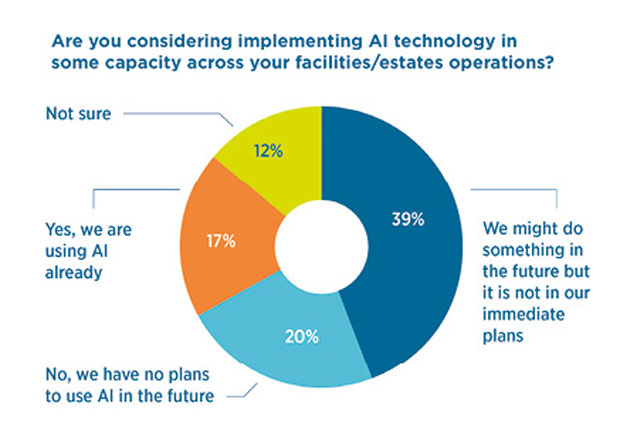 Facilities, property, and workplace management software provider, Service Works Global (SWG) has partnered with FMJ to discover how FMs are using technology. Hazel Bedson, Director, Service Works Global surveys the results
Facilities, property, and workplace management software provider, Service Works Global (SWG) has partnered with FMJ to discover how FMs are using technology. Hazel Bedson, Director, Service Works Global surveys the results
Like so many other industries, facilities management is having to react and adapt to significant socio-economic trends. From the boom in hybrid working and its implications for workplace strategy to the net-zero commitments and a need to decarbonise the built environment, the role of the facilities manager feels increasingly complex.
Against this backdrop is an ongoing digital transformation and the potential for it to make organisations both smarter and more efficient. But it can be tricky to know how far facilities management is on this particular journey and where it might be ultimately heading. The range of technologies at FMs disposal is growing all the time, including long-established software such as CAFM and ‘newer’ solutions such as building information modelling (BIM).
Each year for the last 12, Service Works Global has sought to learn more about how facilities practitioners are using technology through an industry survey. In March 2024, we partnered with FMJ to survey respondents on several key issues, including their views on AI, other smart technology such as IoT sensors, BIM and digital twins, and the challenges they face in applying many of these solutions. This research has allowed us to identify many of the current trends and create a clearer picture of how technology is shaping the delivery of FM services.
IS FM READY FOR THE AI REVOLUTION?
AI has dominated the headlines since the launch of the generative AI tool ChatGPT in 2022. Historically, a substantial amount of fear has surrounded the technology regarding its threat in replacing human workers, but views are changing. As the Royal Institution of Chartered Surveyors (RICS) wrote earlier this year: “While AI may reshape certain aspects of the jobs, the focus should be on augmenting human expertise rather than replacing it entirely. By equipping oneself with AI skills, facilities managers can not only adapt to the changing environment but also mentor and guide the next generation, ensuring that the integration of AI enhances rather than diminishes the profession.”
The potential of AI lies in its ability to automate processes as well as crunch large datasets to improve decision-making and solve complex problems. In theory, AI could support FM professionals in maintenance, space management, compliance, energy efficiency, stakeholder relations, workflow automation, and more. There are several examples where AI is already making a difference. Planned preventative maintenance schedules can be made more accurate and efficient using AI-powered software to keep track of when an asset was last checked and when it should be next serviced to avoid costly downtime, while AI can assess occupancy data to identify peak hours of building use and then schedule more disruptive maintenance activities for quieter periods.
Still, our survey findings revealed a notable gap between theory and practice. Only 17 per cent of respondents said they are currently using AI, while just 12 per cent said they plan to use it in the next 12 months. Interestingly, our research showed that despite the hype, meaningful applications are some way off for many – 39 per cent claimed they have no immediate plans to use it, and a further 20 per cent admitted that it is not on their radar at all.
This gap may be explained by the FM industry’s sluggish adoption of technology generally. According to the survey, more than one in three respondents (38 per cent) are still tracking areas such as asset performance with paper documents, while nearly half (45 per cent) continue to rely on manual reviews of service performance.






